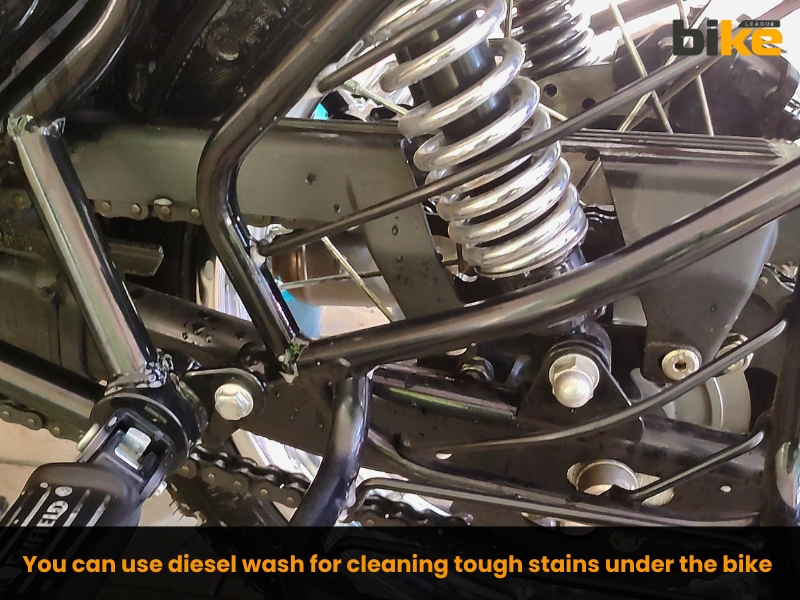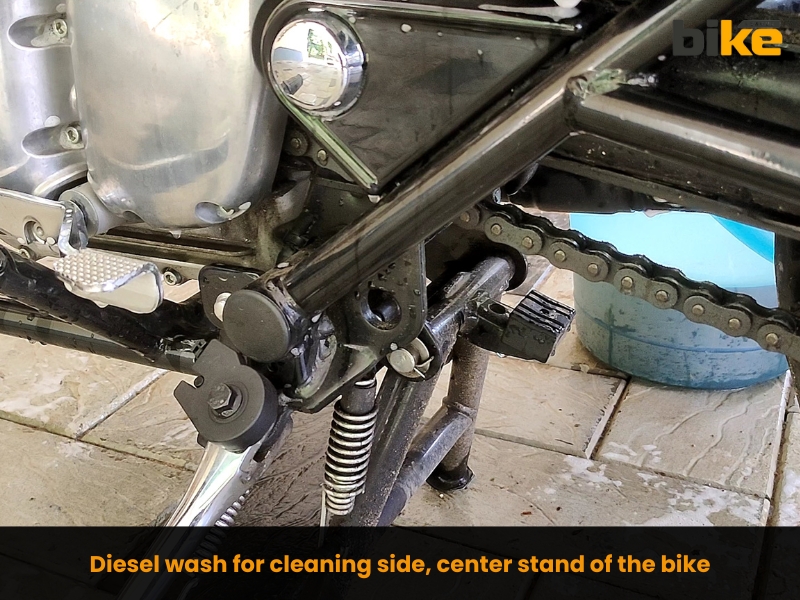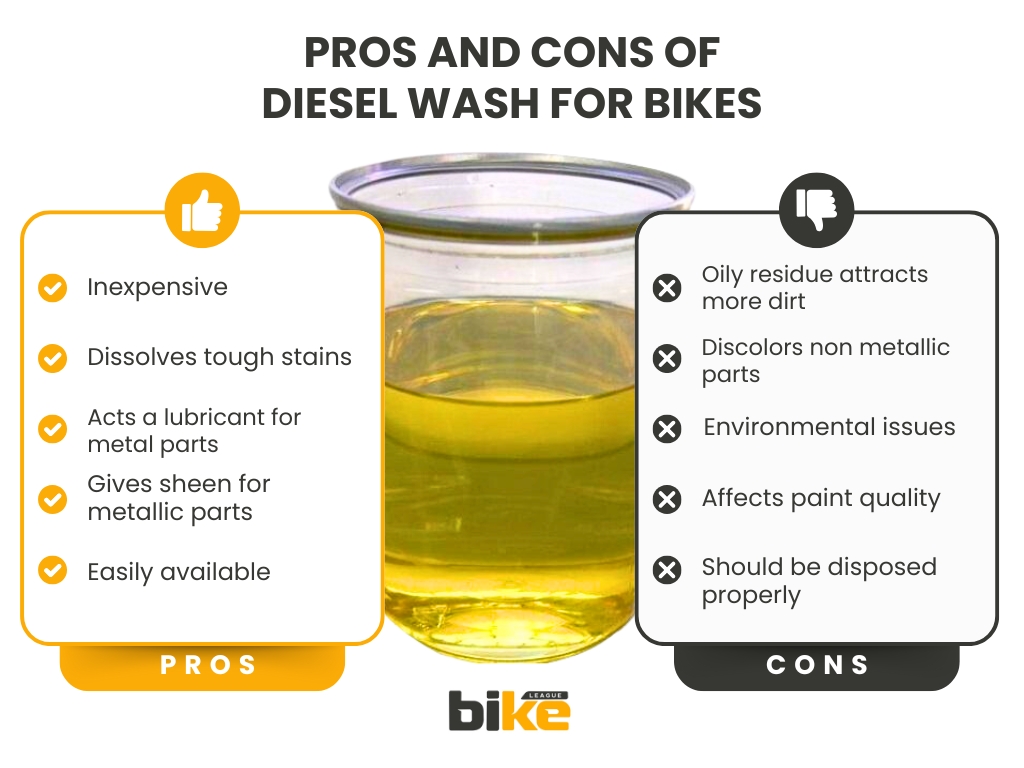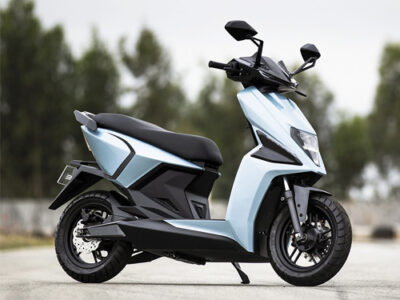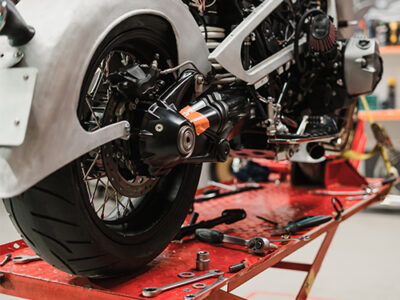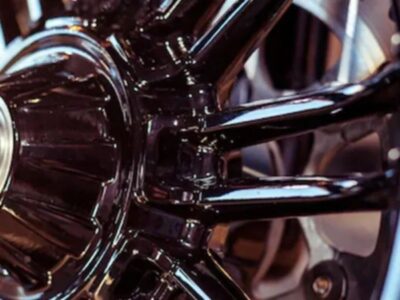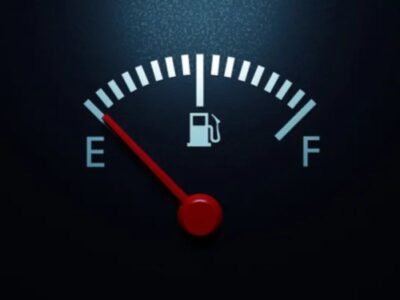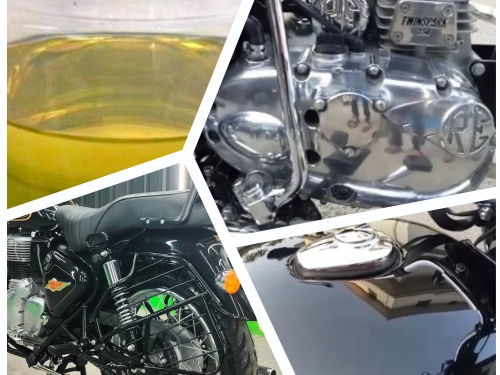
|
Getting your Trinity Audio player ready...
|
Long story short: Explore the benefits and limitations of diesel wash for your bike. Learn how to remove oil and grease without damaging bike paint and alternatives to diesel wash. Our comprehensive guide will give you a clear-cut idea about the process we take when applying diesel wash to your motorcycle.
Introduction
Diesel and petroleum products are not new cleaning products. Due to their ability to dissolve grease and oil, they have long been utilized in mechanical and automotive maintenance.
In India, diesel washing is particularly popular for cleaning motorcycle parts that accumulate oil, grease, mud, and rust, especially on iron and chrome components.
Diesel washing is a practical and cost-efficient cleaning method for robust bikes on Indian roads. It is a popular choice. However, it also presents challenges and controversies that warrant further examination.
Key Takeaways
- Diesel washing is a cost-effective way to deep-clean bike components, effectively removing grease while needing careful handling for safety and surface protection.
- The diesel wash process involves applying diesel to areas with heavy grime, cleaning with multiple rounds, and rinsing to remove dirt and residue, commonly used for metal bikes like Royal Enfields.
- Benefits of diesel wash include effective bike cleaning, improved shine on metal surfaces, lubrication of parts, and cost-effectiveness compared to specialized cleaning products.
- Limitations of diesel wash include residue buildup attracting dirt, environmental impact from improper disposal, and potential damage to non-metallic bike parts or sensitive finishes.
- Experts advise against diesel washing due to potential damage to paint and parts, recommending specialized cleaners and raising concerns about environmental pollution.
- Users with metal bikes like Royal Enfields find diesel effective. Still, concerns include paint damage, rust, and environmental impacts, such as water contamination and air pollution.
- Alternatives to diesel wash, like eco-friendly solutions, automated systems, waterless products, biodegradable detergents, and steam cleaning, are more sustainable and eco-friendly.
Popularity
The popularity of diesel wash for bikes in India can be attributed to several factors:
- Effectiveness: Diesel is known for its ability to cut through tough grime and oil stains. It is a trusted and practical choice for cleaning heavily soiled motorcycles.
- Cost-Effectiveness: Diesel, being relatively inexpensive compared to specialized cleaning agents, is an innovative and economical choice for many bike owners in a price-sensitive market, making them feel financially savvy.
- Cultural Acceptance: Diesel wash has become deeply ingrained in the Indian biking community, especially among those who own metal bikes like Royal Enfield, known for their robust build and tendency to accumulate grime. This cultural acceptance makes them feel part of a community.
- Ease of Access: Diesel is readily available across India, which adds to its popularity as a motorcycle cleaning agent.
This practice has become particularly prevalent in regions where motorcycles are frequently exposed to harsh conditions that lead to the accumulation of oil and grime. Dusty and often muddy roads in many parts of the country call for thorough cleaning methods, which diesel washing provides.
The Process of Diesel Wash for a Motorcycle
The motorcycle diesel wash process involves using diesel fuel as a cleaning agent to remove dirt, grime, and stains from a motorcycle. Here’s a breakdown of the typical process:
- Application: Diesel is applied to the bike, focusing on areas with heavy oil and grease buildup, such as the chain sprocket.
- Cleaning: The diesel helps break down tough stains and grime, especially on metal surfaces.
- Multiple Rounds: The process often includes multiple rounds of washing to ensure thorough cleaning.
- Rinsing: After the diesel has done its job, the bike is rinsed to remove the loosened dirt and diesel residue.
This method is prevalent for cleaning metal bikes like Royal Enfield (RE) motorcycles, effectively removing grime, tar, and oil stains.
Diesel wash Benefits for a bike
Benefits of diesel wash for a bike include:
- Effective Cleaning: Diesel’s ability to dissolve tough stains and grime makes it an effective motorcycle cleaning agent. It can improve the sheen of metal surfaces, giving the bike a polished look.
- Lubrication: Diesel’s oily residue can act as a lubricant, which might benefit metallic bike parts.
- Cost-Effective: As mentioned earlier, diesel is relatively inexpensive compared to specialized bike cleaning products, making it a cost-effective option for many bike owners.
Limitations of diesel wash for a bike
Limitations of diesel wash for a bike include:
- Residue Issues: Diesel’s oily residue can attract more dirt and dust if not properly rinsed off, potentially leading to more frequent cleaning needs.
- Environmental Impact: Using diesel as a cleaning agent can have negative environmental impacts due to its chemical composition. Improper disposal of diesel-contaminated water can lead to soil and water pollution.
- Potential damage for non-metallic parts: Diesel can damage or discolour bikes with non-metallic parts or sensitive finishes. For instance, it can cause paint to fade or peel and damage plastic components, making them unsuitable for all bike types.
Expert Opinions
Experts generally caution against using diesel wash due to the potential damage it can cause to the paint and other components of the motorcycle.
They recommend using automotive shampoos and other specialized cleaning products to clean effectively without harming the bike’s paint or mechanical parts.
Experts also raise environmental concerns, pointing out the potential for water contamination and the improper disposal of diesel-laden water. They advocate for more environmentally friendly cleaning methods.
Specifically, diesel use can lead to water pollution if not disposed of properly, and the release of volatile organic compounds (VOCs) into the atmosphere can contribute to air pollution.
User Experience
- Some users, particularly those with metal bikes like Royal Enfield, report positive experiences. They note that diesel removes grime, tar, and oil stains, leaving the bike with a sheen.
- Others express concerns about the long-term effects, reporting issues such as paint damage and the potential for rust if the diesel needs to be thoroughly washed off.
Environmental Impacts
- Pollution and Toxicity: Diesel contains various hydrocarbons and additives that can harm the environment. When used in washing, it can contaminate water sources and soil, leading to pollution.
- Air Quality: Diesel contains volatile organic compounds (VOCs) that can evaporate into the atmosphere, contributing to air pollution. This is particularly concerning in urban areas where vehicular emissions have already compromised air quality.
- Impact on Materials: Diesel’s corrosive nature can degrade paint and plastic components, releasing micro-particles into the environment.
Alternatives for diesel wash
There is a noticeable shift towards safer and more sustainable cleaning alternatives in India. Several trends and alternatives are emerging, and they are:
- Eco-Friendly Washing Solutions: Eco-friendly car and bike washes are gaining popularity as they minimize water usage and reduce chemical runoff.
- Automated Washing Systems: Automated bike wash systems use significantly less water than traditional methods and incorporate water-recycling technologies.
- Waterless Cleaning Products: The development and use of waterless cleaning products are rising. These products are to clean vehicles without water, thus conserving a vital resource.
- Biodegradable Detergents: Using biodegradable detergents instead of diesel can significantly reduce environmental harm. These detergents break down naturally without leaving harmful residues.
- Steam Cleaning: Steam cleaning is an effective alternative that uses high-pressure steam to clean surfaces. It is chemical-free and uses minimal water, making it an environmentally friendly option.
FAQ about diesel wash For a bike
1. Is diesel wash safe for all parts of a motorcycle?
No, diesel wash is not safe for all parts. It can damage the paint and ruin the braking system if it comes into contact with brake discs or pads. Avoid using diesel on painted surfaces and brakes.
2. Why do some people choose diesel wash over other methods?
Some people opt for diesel wash because it effectively removes oil and grease from specific bike parts like the chain and sprocket. However, this method is generally discouraged due to its potential to harm other components.
3. What are the risks of using diesel for bike washing?
The primary risks include damage to the bike’s paint, reduced braking efficiency due to contamination of brake components, and potential fading of matte finishes.
4. What are the alternatives to diesel wash for cleaning bikes?
Alternatives include using automotive shampoos, kerosene for chain cleaning, and de-greasing solutions like WD-40. These options are less harsh and safer for the bike’s paint and other components.
5. Are there any specific types of bikes that can withstand diesel wash?
Diesel wash might suit complete metal bikes with a gloss finish, such as certain Royal Enfield and Honda CB350 models. However, caution is still advised.
6. How does diesel wash affect the environment?
Using diesel for washing can contribute to environmental pollution due to the release of hydrocarbons. It is not an eco-friendly option.
Here are some related articles from our team
- Bike wash – Different types, procedures, precautions, FAQ
- Diesel bikes in India: Why are they absent on Indian roads ?
- Motorcycle chain – how to clean, adjust & maintain
- Bike engine oil – Everything you need to know explained
- Oben
Conclusion
Bike diesel washing offers benefits such as effectively removing tough grease and grime. However, its limitations include potential environmental harm and potential damage to plastic bike components if not done carefully.
While effective and cost-efficient, this method poses risks of water and soil contamination and long-term damage to bike components, especially non-metallic parts. The future of bike cleaning in India is leaning towards sustainable alternatives, such as automated washing systems and biodegradable products.
Bike owners, service providers, and policymakers must collaborate in promoting eco-friendly cleaning practices. As we move forward, we must balance maintaining our bikes with protecting the environment for a cleaner, greener future.
If you have any questions or need more information about bike diesel wash benefits and limitations, leave a comment below. We’re always here and happy to help! Similarly, don’t forget to check out Bikeleague India on our social media platforms to stay connected!

